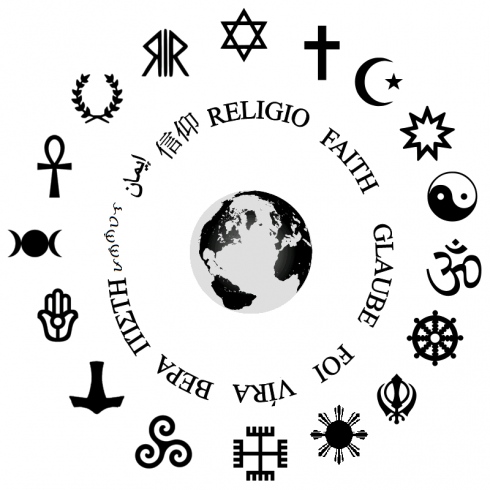Everywhere you look, it seems as if we as a society are seemingly overwhelmed with religion. This is my criticism of modern religion, and an explanation of why, I choose not to claim modern religion.
Growing In Numbers Of Followers?
With roughly 4,000 religions worldwide, there is much to choose from. One of my criticisms of modern religions movements is that many religions are looking to build their following in numbers. It should come as no surprise why ‘the church’ is against birth control methods; it decreases the birth rate, and therefore, decreases the number of followers of that religion.
Mormons are a perfect example of religion encouraging the number of followers by having as many children as they possibly can. The more children that are born into a religion, the more children can be brought up in that religion, and if all goes well, will have lots of children of their own to add to the religious following.
Religion is like a cult, except generally speaking, is not as extreme as a cult. In the United States, freedom of religion is guaranteed under the constitution, and as such, very little, if any oversight is given by the government in terms of religion. It also means that there is no taxation of religious institutions. In my opinion, there absolutely should be tax on religious profits, which would lessen the tax burden of everyone else, but that is just one of the many criticisms of modern religion that I feel should be brought to light.
Intolerance?
Religion is, at least historically speaking, intolerant of other religions. Such was my experience in college when I was consistently asked of my religious views, both by professors and by fellow students. Anytime there was a debate in class, regardless of whether it be scientific fact or general opinion, the professors would generally give more weight to those who quoted bible passages. Suddenly some religious text could dictate the way in which people thought, even in an academic sense.
It came as no surprise that the largest on-campus group was The Campus Crusade For Christ; a group that by its very nature was critical of non-Christians, and would constantly seek to grow its membership by having its members recruit fellow Christian students.
Harmful?
It should come as no surprise that the Catholic church protects its leaders from the shame of pedophilia. How many times do we have to hear about these senseless acts against children before we realize that these religious leaders are people, just like everyone else? How many books need to be written based on religion?
And how many people will we need to treat for religious obsessions once they realize that religion doesn’t hold any answers to real-life problems. Believe it or not, but there exists a condition called scrupulosity in which a sufferer will experience pathological guilt about moral or religious issues, often to the extent that their social functioning is impaired considerably.
By the way, religion is ultimately responsible for many of the intolerable acts against humanity, such as the holocaust, female genital mutilation, and countless wars and other religious-based conflicts dating back centuries. It seems that no matter what may or many not be, every religion claims to have the right answer, and will generally cast doubt towards other religions, regardless of how ridiculous or outlandish their claims may be.
What Does Religion Do?
There are many things religion does for a society. It gives its believers something to believe in, and if they follow the religion closely enough, and embody its teachings, there is generally a reward at the end of life for doing so, though the teachings of religion vary widely. Some religions teach peace, acceptance, and non-violence. Others, sadly, teach the opposite, such as what we are facing as in modern times, turning into terrorism with religious roots.
For a moment, let us take a step back and look at what religion accomplishes. When you are born into religion, you are initiated and accepted into the religion, usually in exchange for a donation. Then, throughout your life, you attend church or practice your religion, all the while, donating towards the religious movement.
With modern religion, you are told what to believe, how to behave, and that your problems can generally be solved through religion. When those problems in life are solved, regardless of the circumstances, people generally credit their religious beliefs or a higher deity for making things right. Even if religion or some higher power had nothing at all in solving the problem, religion still gets credit. At every major turning point in life, religion and the church are generally involved. Weddings, funerals, baptisms, the list goes on and on. All of these so-called services are done in the name of religion, and all ask for a monetary donation to the religious movement.
Unnecessary?
I may be speaking of idealism here, but there is absolutely no human necessity for religious beliefs. Here is a list of things that are necessary, and if you read it through, you will see that religion is on the unnecessary list. Personally, I view going to church, being told what I should believe, and spending countless hours obsessing over what these so-called leaders are trying to convince me of what is true, to be an enormous waste of time.
My Views…
Believe whatever you want to believe. Be free. Be kind. Be respectful. But if anything, please don’t try to convince me that your religion is the truth, or if I am not a believer, that I am somehow going to a bad place when I die, or I am somehow inferior as a non-believer. With an estimated 4,000 or more religions worldwide, that means that there is about a 1:4,000 chance that your religious beliefs are right.







Great post. I found it worth responding to on my blog:
https://this1sforslatin.wordpress.com/2013/11/16/tell-me-all-your-thoughts-on-god-a-case-for-modern-religion/
Thank you for your follow-up post! I have finally added your blog link to my homepage, which was way overdue.
I have also subscribed to your blog with email updates. Also something I should have done a long time ago. 🙂
If you live in the USA, please send me your mailing address as I would like to send you some free stickers. tom@tomslatin.com